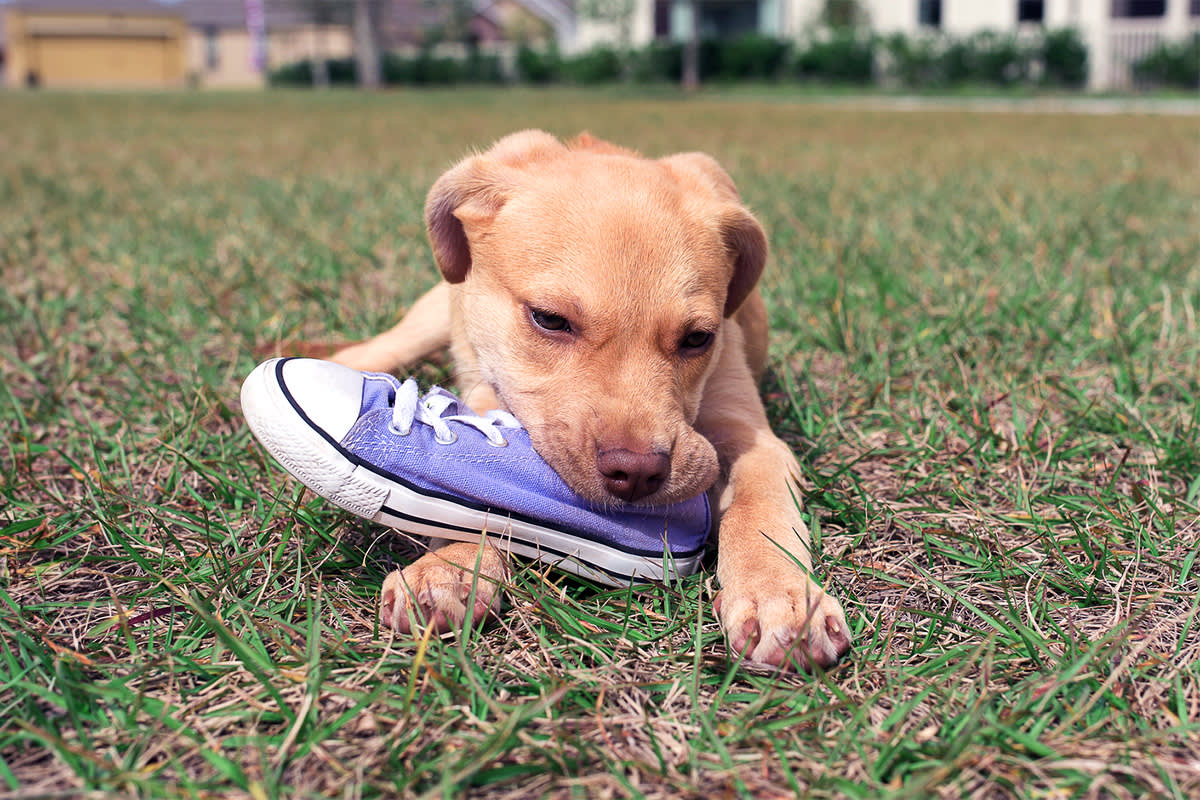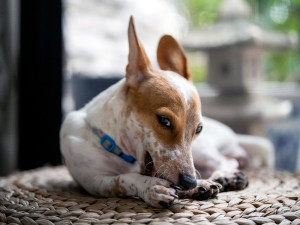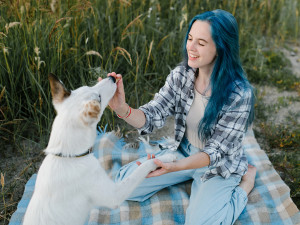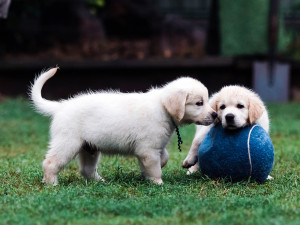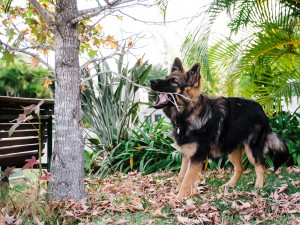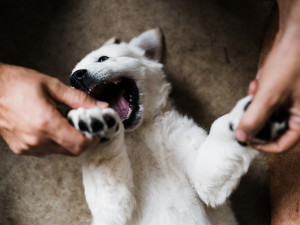6 Behavioral Issues Your Dog Will Actually Grow Out Of—We Promise
Don’t panic—there is hope.
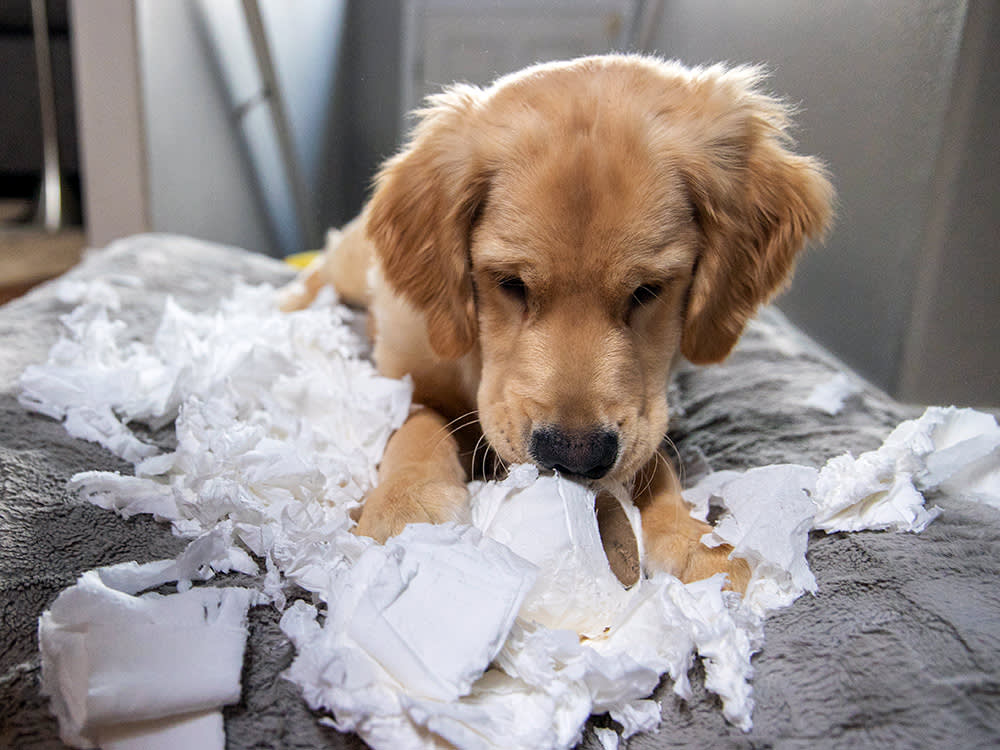
Share Article
It’s super common for people to hope their dogs will just grow out of their problematic behavior, like barking at every dog in the neighborhood, chasing the cat, or biting strangers. That’s not usually the case, but there are a few common behavior issues that most dogs will outgrow — thankfully— especially if we give them just the right guidance. Here’s a look at the behaviors you can expect your dog to outgrow with time, patience, and a little help.
Submissive urination
Does your puppy pee when people greet themopens in new tab, or even when other dogs say hi? Maybe they do it when they hear a loud noise or are surprised in any way. It’s actually pretty common, sad to say. They also often cower, tuck their tails, roll over on their backs, or flatten their ears. The good news? Most dogs stop having this pee-reaction by the time they are a year old.
And even better? Dogs with this issue are usually the sweetest and most gentle pups. Sure, cleaning up the mess is annoying, but remember, it’s a sign your dog has a fantastic temperament. While you wait for this phase to pass, try having all greetings outside or on easy-to-clean floors, keeping the carpets off-limits when people come over. You can also toss a treat over your puppy’s head so they turn away and have a little snack before greeting you, which often helps prevent accidents.
Peeing and pooping in the house
Ah yes, the messes we all dread. No one enjoys cleaning up after a puppy, especially when they leave little surprises around the house. But the optimistic take? Most dogs get the hang of potty trainingopens in new tab within a couple of months. Dogs naturally prefer to do their business far away from where they sleep, eat, and play. So, we’re on the same team here! When I taught puppy classes for dogs eight to 16 weeks old, the potty questions were constant, but by the time the puppies were in the next class, for puppies 16 weeks and older, nearly all of them had gotten the hang of it.

To help speed up the process, keep an eye on your puppy, take them outside frequently (especially after eating, enrichment activities, waking up, or playing), and reward them with yummy treats when they potty outside.
Puppy mouthing
Puppy teeth are sharp, as in sharp as knives. And guess what? Puppies explore their world with their mouths. It’s totally normal for them to nip and bite when they’re excited, teething, or just want to play. But hey, we don’t want to feel like we’re being chewed on like a toyopens in new tab. The good news is this phase doesn’t last forever.
Most puppies go through a mouthy phase that peaks around three months and eases up by seven months. To help your pupopens in new tab move past this, give them tons of appropriate chew toys, get them lots of exercise and mental stimulation, and if they get too bite-y with you, just walk away. They’ll eventually get the idea. And remember: Even if you don’t actively train them, most puppies will naturally stop with the mouthiness as they mature.
Destructive chewing
Chewing is another one of those things that’s part of the puppy package. Puppies chew or destroy things (like toilet paper off the roll) to relieve teething pain, explore their environment, or to relieve energy. But that doesn’t mean they need to chew on your favorite boots or that couch you just bought. (Isn’t it always the most expensive thing they choose?)
The good news is that this destructive chewing phase doesn’t last forever. Young puppies chew a lot, then slow down as they get older. Around the time they hit adolescence, though, they might hit another “chew frenzy,” but this is temporary, too. To save your stuff (and your sanity), make sure they have plenty of pup-safe chew treats or frozen Kongs. It helps them understand what’s OK to chewopens in new tab and what’s off limits.
Adolescent shyness
It’s common knowledge that many puppies go through a period of fearfulness at around two to three months. But did you know adolescent dogs opens in new tab also have an easily “spooked stage?” That may not be good news to anyone who is already going bonkers because their adolescent dog is ignoring them, being frustratingly independent, and generally not acting like the puppy they have come to know and love.
Well, the good news is that this period is temporary, usually lasting just a few weeks or a month or so. With support from you — letting them be near you, giving them treats or toys when they are overwhelmed, and talking to them cheerfully — many young dogs quickly stop being a little anxious and uncertain. Soon, they return to being the more confident pups they were before.
Extreme energy and jumpiness
Living with a dog who seems to have unlimited energy? Yeah, I feel you. High-energy pups are exhausting. (Charming, but exhausting.) But don’t worry, while your dog might always be a bit of a ball of energy (because let’s face it, most dogs don’t turn into lazy couch potatoes), they will eventually calm down. The youthful energy and constant jumping around won’t last forever.
As they get older, they’ll start to have more “chill” moments — and not just when they are sleeping. In the meantime, make sure they’re getting tons of exercise, mental stimulation, and enrichment to help keep their brains and bodies busy. You’ll start to notice they can relax more and more as they mature.
Why you shouldn’t give up
Sadly, dogs don’t miraculously outgrow every behavior problem, but these common puppy issues usually fade with age. If any of these behaviors are one of your major stressors right now, hang in there! With a little time, patience, and the right support, your dog will soon be moving on from a lot of these habits. Keep doing your best, and enjoy the puppy journey — it’s so worth it.

Karen B. London, PhD, CAAB, CPDT-KA
Karen B. London is a certified applied animal behaviorist (CAAB) and certified professional dog trainer (CPDT) who specializes in working with dogs with serious behavioral issues, including aggression. She has written for a variety of magazines including The Bark, Clean Run, and the APDT Chronicle of the Dog, and has published in scientific journals including Behavioral Ecology and Sociobiology, Ethology, Ecology, and Evolution, the Journal of Insect Behavior, and Insectes Sociaux. She is the author of seven books about dog training and canine behavior, including the forthcoming My Dog's Mystery Adventure: And Other Stories From a Canine Behaviorist and Dog Trainer.
Related articles
![A Terrier Puppy With Spots And Big Ears Chews On Their Paws.]()
Why Do Dogs Chew Their Paws?
And when will it stop?
![girl with blue hair starting puppy training with white dog]()
Puppy Training 101: How to Train a Puppy
You gotta start somewhere.
![Two Golden Retriever puppies playing with a large blue tennis ball outside in the grass]()
What to Expect at Puppy Socialization Classes
A dog behaviorist schools us on why puppy classes are more about socializing than getting straight As.
![German Shepherd puppy pulling at a branch]()
Dog Life Stages: Puppy Adolescence Is Only a Phase
What to expect when your perfect puppy hits that unruly stage.
![Golden retriever puppy upside down playing with a mans hands and attempting to play bite.]()
How to Train a Puppy Not to Bite
Those little razor teeth are no fun.

